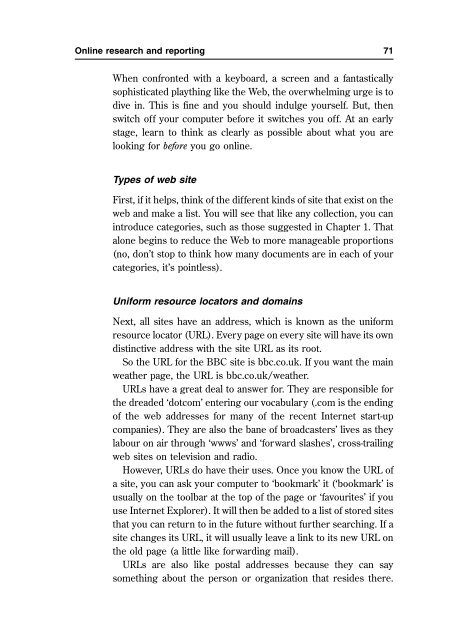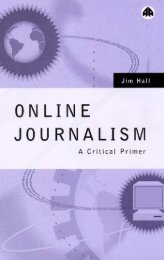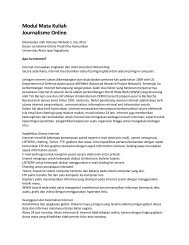1What is online journalism? - Ayo Menulis FISIP UAJY
1What is online journalism? - Ayo Menulis FISIP UAJY
1What is online journalism? - Ayo Menulis FISIP UAJY
You also want an ePaper? Increase the reach of your titles
YUMPU automatically turns print PDFs into web optimized ePapers that Google loves.
Online research and reporting 71<br />
When confronted with a keyboard, a screen and a fantastically<br />
soph<strong>is</strong>ticated plaything like the Web, the overwhelming urge <strong>is</strong> to<br />
dive in. Th<strong>is</strong> <strong>is</strong> fine and you should indulge yourself. But, then<br />
switch off your computer before it switches you off. At an early<br />
stage, learn to think as clearly as possible about what you are<br />
looking for before you go <strong>online</strong>.<br />
Types of web site<br />
First, if it helps, think of the different kinds of site that ex<strong>is</strong>t on the<br />
web and make a l<strong>is</strong>t. You will see that like any collection, you can<br />
introduce categories, such as those suggested in Chapter 1. That<br />
alone begins to reduce the Web to more manageable proportions<br />
(no, don’t stop to think how many documents are in each of your<br />
categories, it’s pointless).<br />
Uniform resource locators and domains<br />
Next, all sites have an address, which <strong>is</strong> known as the uniform<br />
resource locator (URL). Every page on every site will have its own<br />
d<strong>is</strong>tinctive address with the site URL as its root.<br />
So the URL for the BBC site <strong>is</strong> bbc.co.uk. If you want the main<br />
weather page, the URL <strong>is</strong> bbc.co.uk/weather.<br />
URLs have a great deal to answer for. They are responsible for<br />
the dreaded ‘dotcom’ entering our vocabulary (.com <strong>is</strong> the ending<br />
of the web addresses for many of the recent Internet start-up<br />
companies). They are also the bane of broadcasters’ lives as they<br />
labour on air through ‘wwws’ and ‘forward slashes’, cross-trailing<br />
web sites on telev<strong>is</strong>ion and radio.<br />
However, URLs do have their uses. Once you know the URL of<br />
a site, you can ask your computer to ‘bookmark’ it (‘bookmark’ <strong>is</strong><br />
usually on the toolbar at the top of the page or ‘favourites’ if you<br />
use Internet Explorer). It will then be added to a l<strong>is</strong>t of stored sites<br />
that you can return to in the future without further searching. If a<br />
site changes its URL, it will usually leave a link to its new URL on<br />
the old page (a little like forwarding mail).<br />
URLs are also like postal addresses because they can say<br />
something about the person or organization that resides there.
















